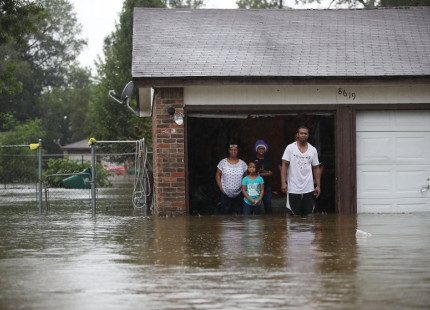Hurricane Harvey: Ground zero for climate justice.
Rebecca Anderson
|August 29, 2017

A group awaits rescue in Houston on August 28, 2017. Photo Credit: Joe Raedle—Getty Images
There are 50 inches of rain falling – 50 inches, over four feet. That’s how much rainfall Hurricane Harvey is expected to dump on southern Texas before it’s all over.
It’s hard to actually comprehend what that much rain means.
I’m trying to get my mind around it. To put it in perspective, Hurricane Sandy, whose 5-year anniversary is fast approaching, had a maximum rainfall of 12 inches. The most rain recorded from Katrina was 15 inches. According to the USGS, there are only five states in the country whose average precipitation in a whole year is greater than 50 inches. Texas isn’t one of them.
Did Harvey happen because of climate change? The evidence is becoming clearer and clearer.
This is unprecedented – so unprecedented that the National Weather Service had to add new colors to its weather map this week to accurately measure and display all of this rain. There used to be 13 colors to show amounts of precipitation between 0.1 inch and 15 inches. Now there are two additional shades of purple to go up to 30 inches and beyond.
It reminds me of the time not long ago that Australia had to add new colors to its weather map for unprecedented levels of extreme heat. And, this phenomenon is likely the new normal.
Did Harvey happen because of climate change? Scientists agree that a warmer climate helped shape Harvey, and shockingly, this is Houston’s third “500-year flood event” in the last three years. The evidence is becoming clearer and clearer. An extra 8 inches of sea level rise over the last 100 years is laying the foundation for worse flooding. A super-warm Gulf of Mexico (up to 7ºF warmer than average) is providing extra heat to feed storms like Harvey. Warm, humid air is producing torrential rains because warm air holds more moisture (4% more moisture for every 1ºF to be exact), and that allows storms like Harvey to dump 50 inches of rain in a week.
Climate change, at its core, is a justice issue.
One thing that’s certain is that the effects of Harvey are being felt deeply felt by those living in and around Houston. For them, climate change is real and it’s here. Though just last week, a new rule states that government agencies don’t have to account for climate change when building new infrastructure. The Federal Emergency Management Agency (FEMA) isn’t required to include sea level rise in their floodplain maps. And, thousands of people whose homes are now underwater, have no flood insurance to help them clean up. Why? Because their houses weren’t listed as being in a floodplain – a line on a map that Hurricane Harvey blew right past.
The true injustice of Harvey is that many of the people who have lost their homes and lives to Harvey are the same people who have to live with the environmental degradation, polluted water and toxic air from the oil and gas refineries along the Gulf Coast. They are caught in a cycle of climate injustice, hit first from the plague of fossil fuel development in their backyards, and second by the carbon pollution that causes climate change-fueled disasters like Harvey.
We can’t afford to stick our heads in the sand any longer.
Climate change, at its core, is a justice issue that affects people and places very differently. Weather disasters like Harvey aren’t distributed equally – they disproportionately affect the same people in the same communities. Too often, those affected are people of color, low-income communities, and those with the fewest resources to protect themselves. I truly hope that they are not also left behind when it comes to the rescue and relief efforts over the next several days. Already, we know that undocumented immigrants in Harvey’s path are facing a horrific choice – call 911 and possibly be deported, or don’t, and risk serious injury or death.
Maybe this storm will just be another in a growing list of climate-fueled disasters. Or, maybe this is the moment when we finally look around and realize that the world we live in is not the same as the one our parents or our grandparents lived in 30 or 50 years ago.
We can’t afford to stick our heads in the sand any longer. Because Harvey has washed it all away.
Please join us in supporting those suffering the effects of Harvey in and around Houston. We invite you to make a tax-deductible donation to Houston Mayor Sylvester Turner’s Hurricane Harvey Relief Fund, managed by the Greater Houston Community Foundation, a 501(c)(3) public charity, or explore #AJustHarveyRecovery, a local, frontline effort that needs your help.
Join our Youth Action Network
More Blog Posts

Unnatural, Not Unprecedented
For two weeks, residents of Southern California endured a waking nightmare. Parents raced against time – hurrying down the driveway …
Read MoreCrafting a Vision for the Future: My Experience at LCOY USA 2024
Dry and sunny Tempe, Arizona where temperatures have been over 100 F for 113 consecutive days, delegates gathered to attend …
Read More
7 Ways to Weatherproof Your Home on the Cheap (+1 Not-So-Cheap)
As colder weather sets in, understanding how to weatherproof your home is key to maintaining warmth and reducing energy costs. …
Read More
